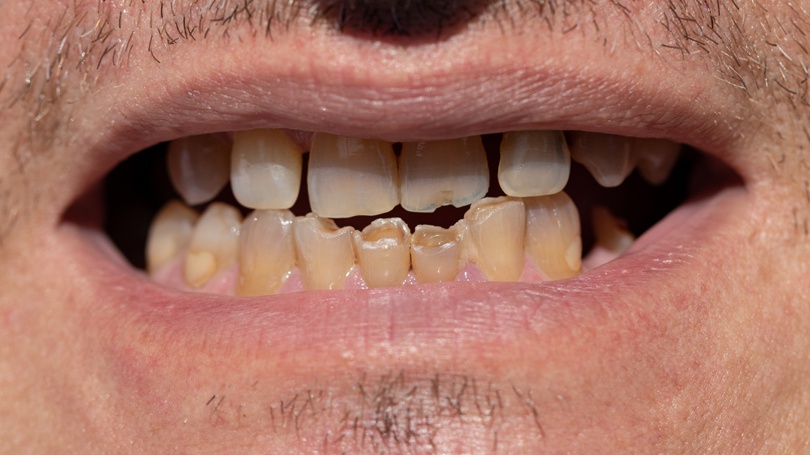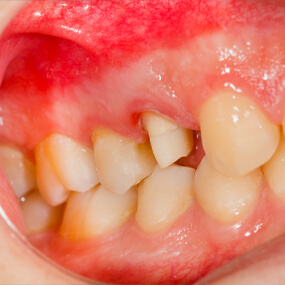Streptococcus Mutans: How It Causes Tooth Decay

Dental cavities are common knowledge. Most Americans will have at least one cavity in their lives, and if you surveyed them on the causes, sugar would be the likely answer. Few, if any, would blame it on streptococcus mutans—often abbreviated S. mutans—even though it played a key role in the problem.
Your mouth is home to many bacteria that form communities. Much of these bacteria play a positive role, such as assisting with predigestion. Others are harmful, particularly if growth occurs unchecked. The bacteria streptococcus mutans, for instance, can be found on the surfaces of all teeth, and it plays a prominent role in breaking down your tooth enamel and causing even more serious tooth decay.
Streptococcus Mutans
Streptococcus mutans is just one of the bacteria associated with tooth decay, but it is considered to be the leading contributor. That said, there is still much that dental science does not know about cavities. It is known that streptococcus mutans can build up at any age, including in infants whose baby teeth have yet to erupt. The key to controlling the bacterial growth lies in controlling the environment: your mouth.
The Effect on Children
Cavities—also known as dental caries—are so common among kids that we often associate them with childhood. But early childhood cavities, which are identified as those that occur between birth and age six, can be particularly disruptive. They can cause pain and distress and have an impact on their systemic health, and the damage to baby teeth can have ramifications that affect the permanent teeth.
The American Dental Association notes that early childhood cavities are more common than asthma and that the problem is exacerbated at the lower income levels. The ADA recognizes it as a public health issue and advises that the solution lies in adjusting children’s diets and oral hygiene routines.
The Effect on Adults
Young adults are less likely to experience cavities than children, but that can often lead to a false sense of confidence. Many young adults do not get the preventative dental care they should. As a person ages, changes occur that make them more prone to xerostomia—also known as dry mouth—and receding gums that expose the tooth roots. In addition, older adults are often prescribed medications that can make them more susceptible to tooth decay and other oral health issues.
Controlling Streptococcus Mutans
Cavities occur because bacteria like streptococcus mutans interacts with food particles and your saliva to create acids and form plaque. Complex carbohydrates are particularly problematic when it comes to this interaction, which is why sugar gets such a bad rap. The biofilm that accumulates on your teeth is constantly attacking them, which why it so important to clean and disrupt the plaque in your mouth.
You can make this task easier by adjusting your diet. Limit your intake of sugars and starches. Be wary of pasty starches that stick to your teeth, such as potato chips. Also, be careful about introducing acids directly, such as drinking diet sodas or chewing on sour candies. You should also:
- Brush twice a day for two to three minutes.
- Use fluoride toothpaste and a soft-bristled brush.
- Floss whenever you brush.
- Brush or scrape your tongue whenever you brush.
- Stay hydrated. Sip water throughout the day.
- Eat a well-balanced meal and opt for teeth-healthy snacks.
- See your dentist at least twice a year.
- Discuss pit and fissure sealants with your dentist.
If you adhere to this advice from childhood and throughout adulthood, you will never experience a cavity. Despite cavities being among the most prevalent human diseases—second only to the common cold—they are easily preventable with good oral hygiene. Some people are more prone to cavities than others, but your dentist can identify your risk and help you to mitigate them.
Managing streptococcus mutans is something you will have to do throughout your life, but it does not have to be difficult. If you establish good oral care habits and adjust them as needed under the guidance of your dentist, it takes less than 10 minutes a day to keep that bad bacteria in check.
Win the Battle Against S. Mutans
Your battle against streptococcus mutans begins at home by brushing and flossing twice a day every day. It is also imperative that you see your dentist on a regular basis. Not only will a skilled oral hygienist clean your teeth, but Jeffrey D. Clark, DDS, will assess your oral health and make personalized recommendations regarding your oral care. Schedule your checkup with Dr. Clark at Scottsdale Cosmetic Dentistry Excellence by calling us today at 480 585 1853.




